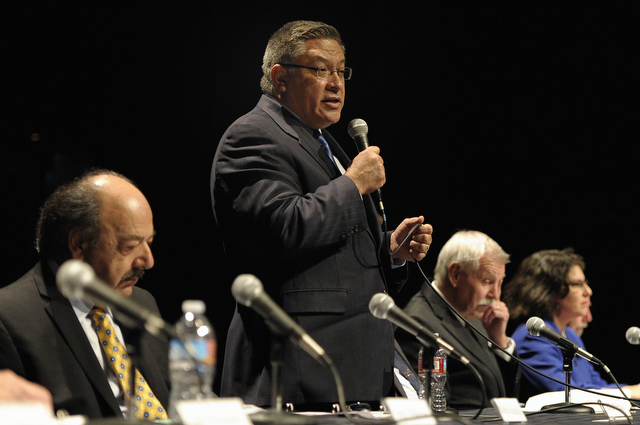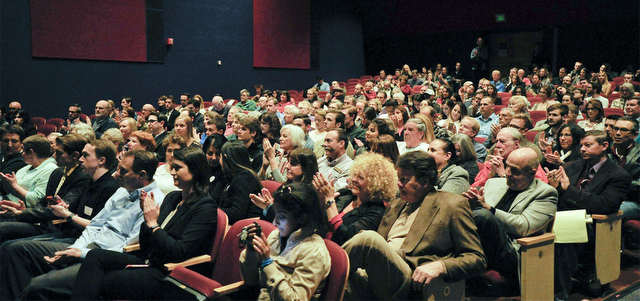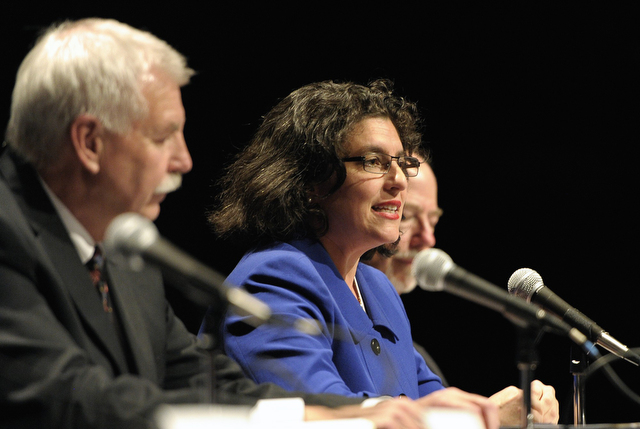First Congressional Debate a Lively One
Candidates Talk Education, Health Care, Business Regulation

In the highly anticipated first debate in the Central Coast’s wide-open congressional race, moderator Randol White with KCBX aptly summed up the evening in closing remarks: “It’s a crowded table.”
Vying to replace Congressmember Lois Capps, who has held the seat for nearly two decades, nine candidates separated themselves mostly along party lines while injecting healthy doses of their personalities to attendees at a packed Cal Poly, San Luis Obispo auditorium Thursday.
The four front-runners — Democrats Salud Carbajal and Helene Schneider and Republicans Katcho Achadjian and Justin Fareed — rarely deviated from their respective blue-red talking points. The district, comprising San Luis Obispo, Santa Barbara, and a sliver of Ventura counties, is one of the most competitive in the state — with just 3.4 percent more registered Democrats than Republicans.

The event initially ran like a forum, with participants allowed 90 seconds to answer four questions drafted by Cal Poly’s political science department. The other five candidates — Steve Isakson, Jeff Oshins, Bill Ostrander, John Uebersax, and Matt Kokkonen — proved more willing to interrupt the rigid format.
Oshins — frank, funny, and unassuming — snapped at his conservative counterparts at the table: “I want to ask you if you are going to sign [Grover Norquist’s anti-tax pledge].” Achadjian rebutted: “Are we going to stick to the questions we have, or are we going to get [off topic]?” White, who seesawed between reeling the candidates in and letting them run wild, agreed to stick to the prescribed questions.

In that vein, Carbajal and Schneider — Santa Barbara county supervisor and city mayor, respectively — sounded remarkably similar on nearly every issue: college loans, minimum wage, the Affordable Care Act, Big Pharma, climate change, etc.
When asked about the federal government’s role to improve higher education, both proposed the same list of solutions (albeit in a different order): reduce student debt, increase federal loans and grants, and support President Barack Obama’s free two-year community college plan.
Schneider added combating sexual assault. She mentioned the state’s recently adopted “Yes Means Yes” law, authored by State Senator Hannah-Beth Jackson, who is her key local endorsement. Schneider said her experiences working in human resources at Planned Parenthood and as mayor would be useful on the federal level.
Early on, Schneider sought to distinguish herself as the only woman at the table. “I am not a yes man,” she said. Her royal blue jacket stood out next to the line of men in gray and black suits.
Carbajal, who leads the pack in terms of fundraising and Democratic endorsements, told the crowd his father was a farmworker in Oxnard. He was the first in his family to go to a four-year university and is now a father of two. “I know what it’s like to cobble up resources,” he said. “The two most pressing challenges [in higher education] are accessibility and affordability.”
Ostrander — the self-proclaimed campaign-finance crusader — asked the audience, “How many people think there is too much money in politics?” Lots of hands went up. He pulled out his iPhone, took a photo of the crowd, and promised to give the picture to whoever wins the election. He deemed reforming political fundraising as the easy fix to end gridlock in Washington: “Most of us are wired to be in the center,” he said. “Take the money out of it, and you will not have the polarity.” Ostrander made a point to stand up from the table when he spoke: “I feel more comfortable,” he said.

Achadjian, who represents San Luis Obispo in the State Assembly, meanwhile, appeared less than enthused. Putting on reading glasses, he simply read from notes several times during the two-hour event. He acknowledged he was a little “wobbly,” as he arrived just an hour before the debate after driving from Sacramento. (Achadjian, who owns several gas stations in the area, has pointed to his busy assembly schedule as the reason he lags in campaign fundraising.)
Still, his home-court advantage was clear. When asked if he wanted to rebut Ostrander’s assertion that health care should be a right — “not a privilege” — he said, “No, I want to give him my applause for pronouncing my name correctly.” The audience laughed.
The crowd booed, however, after Republican Kokkonen said the United States has the best and most sophisticated medical care in the world. Defensively, he said, “I stand by that.” Kokkonen, a San Luis Obispo-based financial adviser who emigrated from Finland in 1945, has run a number of times for federal and state offices.
For the most part, Republican Fareed — a young, ambitious, second-time congressional candidate — stuck to his narrative. “I’m running for congress because career politicians have broken this political system,” he said, “and it doesn’t work for you.” He worked as an aide for Kentucky Congressmember Ed Whitfield from 2012-2013.
Fareed, who works for his family’s Montecito sports medical device business, noted more than once he wanted to “reduce the bloated size of government.” “I’ve seen regulation … that made it difficult for businesses like ours to survive, let alone thrive,” he said. He proposed to “get bureaucrats out of the way” to promote business owners. “When they succeed, we succeed,” he said.
Ostrander swung back: “That is the Republican playbook we’ve heard for the last 34 years, and it has not worked very well, has it?” Fareed and Ostrander also got into a testy back-and-forth over the Affordable Care Act, which Fareed called “the largest federal boondoggle,” adding, “Most people literally passed it without reading it,” he said.
Oshins got the last word, standing up and walking to the front of the table. “Students, I’m doing this for you guys.” He promised to organize meet-ups for parents about loan debt and to keep talking until the issue takes off.
The group is expected to debate again soon; exactly when and where has not been decided.



